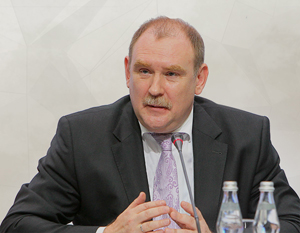Ru
|
Eng
IAEA: Nuclear power engineering will inevitably expand
23.06.2014

Nuclear power engineering will inevitably expand and it is an obvious fact. The statement was made by Deputy Director General of the International Atomic Energy Agency (IAEA) Alexander Bychkov during the online conference hosted by the BelTA website on 23 June.
“However, the growth will depend on many political, social, and economic factors. Among other things it will depend on how well the other energy resources do. In my opinion, the training of specialists for the nuclear power engineering industry and allied industries is also important. If we assume that the energy produced by nuclear power will double in the next 15 years — it is the most optimistic forecast — then training the necessary number of qualified personnel to match the growth does not seem feasible. From the technical point of view factories can indeed turn out the necessary amount of equipment for nuclear power plants since their capacity is sufficient but training the necessary number of specialists will be difficult. Since existing nuclear power plants will need a new generation of personnel too, then the industry is going to need three times as much personnel, not two times as much. It is a very difficult task to accomplish,” believes Alexander Bychkov.
According to the IAEA Deputy Director General, many experts and scientists believe that at present nuclear power engineering is a stable and environmentally friendly system for manufacturing energy resources and the mankind should use the significant advantages nuclear power generation provides as best as possible.
“At present electricity is in short supply on the global scale and the fact affects the economic wellbeing of nations. There are countries where new sources of electricity are advisable and there are countries where energy effectiveness is more important,” said Alexander Bychkov. “The diversification of energy sources is one of the obvious global modern trends because energy security is a very important matter for many these days. Nations try to diversify their ‘energy basket’. As you know, natural gas, coal, and oil need rather large communication expenses and stable transportation links. Nuclear power doesn’t need those. For instance, in order to reload a nuclear reactor, delivering a fuel assembly once a year by air or by rail is sufficient!”
The IAEA Deputy Director General also added that various schemes to finance the construction of nuclear power plants have been emerging in the last few years. “The IAEA tracks the approaches that exist in the world. Since nuclear installations are expensive to build and consumers later on should be able to afford the electricity they make, we welcome suppliers of nuclear technologies offering flexible schemes to finance nuclear power plant construction projects, for instance, the way Russia does it. Guarantees of the state, which is building the nuclear power plant, to steadily buy electricity in future are also important. The combination of these considerations shapes the future cost and the competitive ability of nuclear kilowatt hours,” noted Alexander Bychkov.
“However, the growth will depend on many political, social, and economic factors. Among other things it will depend on how well the other energy resources do. In my opinion, the training of specialists for the nuclear power engineering industry and allied industries is also important. If we assume that the energy produced by nuclear power will double in the next 15 years — it is the most optimistic forecast — then training the necessary number of qualified personnel to match the growth does not seem feasible. From the technical point of view factories can indeed turn out the necessary amount of equipment for nuclear power plants since their capacity is sufficient but training the necessary number of specialists will be difficult. Since existing nuclear power plants will need a new generation of personnel too, then the industry is going to need three times as much personnel, not two times as much. It is a very difficult task to accomplish,” believes Alexander Bychkov.
According to the IAEA Deputy Director General, many experts and scientists believe that at present nuclear power engineering is a stable and environmentally friendly system for manufacturing energy resources and the mankind should use the significant advantages nuclear power generation provides as best as possible.
“At present electricity is in short supply on the global scale and the fact affects the economic wellbeing of nations. There are countries where new sources of electricity are advisable and there are countries where energy effectiveness is more important,” said Alexander Bychkov. “The diversification of energy sources is one of the obvious global modern trends because energy security is a very important matter for many these days. Nations try to diversify their ‘energy basket’. As you know, natural gas, coal, and oil need rather large communication expenses and stable transportation links. Nuclear power doesn’t need those. For instance, in order to reload a nuclear reactor, delivering a fuel assembly once a year by air or by rail is sufficient!”
The IAEA Deputy Director General also added that various schemes to finance the construction of nuclear power plants have been emerging in the last few years. “The IAEA tracks the approaches that exist in the world. Since nuclear installations are expensive to build and consumers later on should be able to afford the electricity they make, we welcome suppliers of nuclear technologies offering flexible schemes to finance nuclear power plant construction projects, for instance, the way Russia does it. Guarantees of the state, which is building the nuclear power plant, to steadily buy electricity in future are also important. The combination of these considerations shapes the future cost and the competitive ability of nuclear kilowatt hours,” noted Alexander Bychkov.
ANALYTICS
30.08.2023
21.03.2023
30.08.2021
02.07.2021
23.06.2021
10.06.2021
04.06.2021
03.06.2021
20.05.2021
15.05.2021













